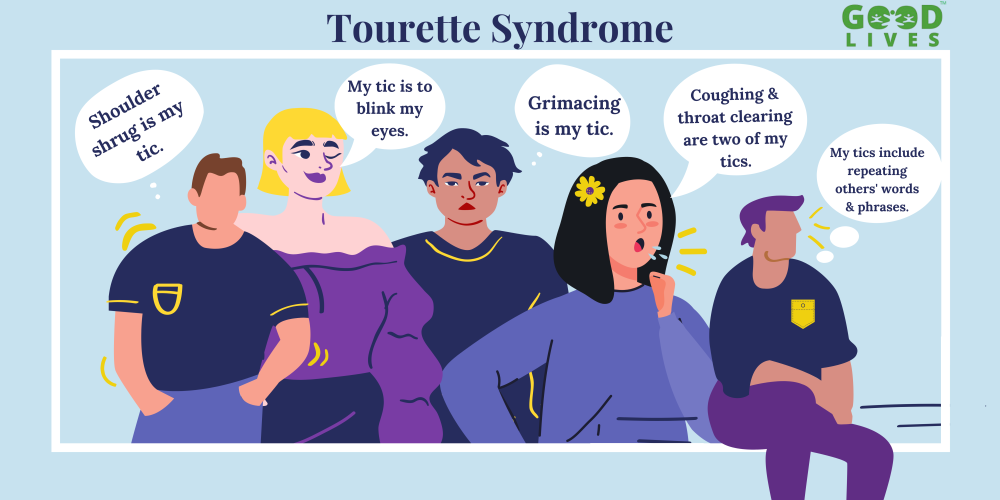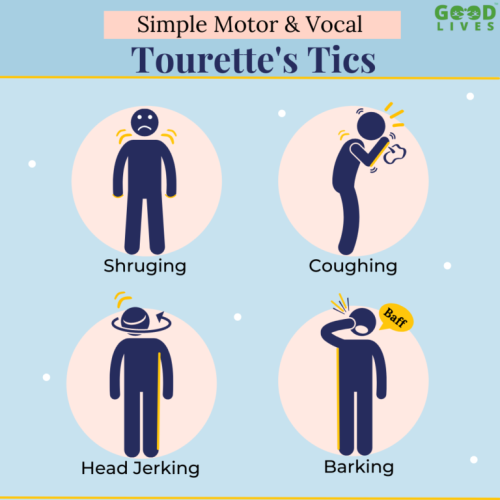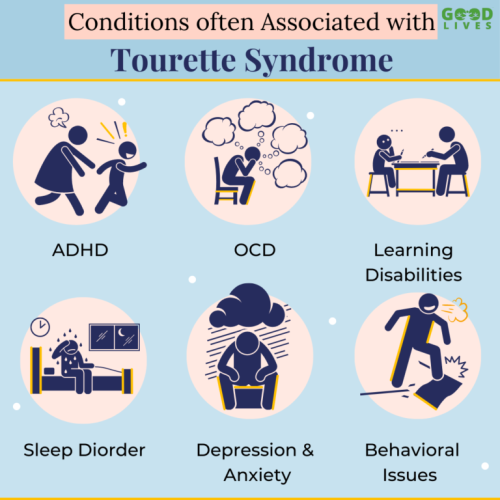Tourette Syndrome Definition

What if one day, you had no control over your actions or the noises you made? Wouldn’t it be terrible if you started shrugging and barking in the middle of a conversation and couldn’t stop it?
For many people, this is a reality. Welcome to Tourette’s world! Let’s take a look at Tourette’s Syndrome in more detail.
Tourette syndrome is a neurological disorder characterized by involuntary repetitive movements or vocal sounds known as tics over which the person has little or no control. Tics can be controlled for a short period, but the person must eventually allow the tics to occur. It could last anywhere from a few seconds to several minutes.
Tics include; blinking in a specific pattern, twisting the wrist, shrugging shoulders, clearing the throat, repeating a word or phrase, and making unusual sounds. A person with Tourette syndrome has a unique pattern of tics that they repeat over and over again. Tourette syndrome does not affect intelligence or lifespan. As for now, there is no cure for Tourette syndrome, but different treatments are available.
Many patients never seek medical help if their symptoms are not severe because tics often become less severe as they pass through the teen years. However, there are some people whose tics interfere with their daily activities.
What are Tourette's Syndrome Symptoms?
Tics are the most common symptom. Tics can change from one Tourette’s tics to another and can also vanish for no reason. Tics often emerge between the ages of 2 and 15, with the average age being six years.
Types of Tourette’s tics:
- Motor tics-Involve involuntary movements of the body.
- Vocal tics-Involve involuntary sound.
They are further divided into simple or complex
- Simple tics-Involving only one group of muscles.
- Complex tics-Involve multiple movements and muscle groups at the same time.
These are Tourette's Symptoms List:

Examples of motor tics:
- Simple-Blinking eyes, head jerking, shoulder shrugging, mouth, and jaw movement.
- Complex-Facial grimacing combined with head bobbing.
Example of vocal tics:
- Simple-Grunting, coughing, barking, throat clearing
- Complex-Repeating words or phrases, using swear words. You might wonder what causes Tourette’s to swear.
In the book “Why We Curse” psychologist Timothy Jay proposes that it is caused by damage to the amygdala, an area of the brain that typically regulates anger and aggressiveness this can lead to an inability to manage aggression, including verbal violence or swearing.
Did you know?
Swearing tics are rare and only affect around one in every ten people with Tourette’s syndrome.
Causes of Tourette
The causes of Tourette syndrome are unknown, but there are suggestive reasons. Inherited genetics is passed down from parent to child through genes. A family history of Tourette syndrome or other tic conditions might increase the risk of developing Tourette syndrome, and environmental factors may also play a role. Current research points to abnormalities in certain brain regions, and males are about three to four times more likely than females to develop Tourette syndrome.
Tourette Syndrome is Associated with:

The majority of people with Tourette syndrome also have other health problems, which are usually mental or behavioral disorders, including:
- Attention deficit hyperactivity disorder (ADHD): Inattentive, hyperactive, and impulsive behavior.
- Obsessive-compulsive disorder (OCD): Causes unwanted thoughts and the desire to do something over & over again, such as checking things and cleaning.
- Learning disabilities: Such as dyslexia, and difficulty in reading, writing, and arithmetic, has nothing to do with intelligence.
- Depression & Anxiety
- Behavioral issues: Socially inappropriate behavior, and aggression issues.
Did you know?
Tics are usually worse when a person is under stress or excitement and tends to improve when they are calm. In some individuals, tics get stopped when they are entirely absorbed in something, such as singing.
If you or anyone you know is experiencing any condition associated with Tourette Syndrome, don’t spend time looking for help. Instead, get professional help at: Goodlives
When to Visit a Doctor for Tourette Syndrome?

Cause of Post Traumatic Stress Disorder
If a child exhibits unusual involuntary movements or sounds, you may take them to the doctor although not all tics are caused by Tourette syndrome but can you have tics without Tourette’s? Yes, a kid can have tics, but not all tics are caused by Tourette syndrome; various health problems and medications can induce tics. Tics might appear in toddlers and then disappear after a few weeks or months. However, it’s vital to figure out what’s causing a child’s strange behavior. But whenever a child exhibits unusual behavior, it’s critical to determine the cause.
Did you know how common is Tourette’s in the world?
Tourette’s isn’t a rare condition and it is estimated to affect 1 to 10 in 1,000 children worldwide. It is more common in males than in females.
Tourette Syndrome Treatment
Here are some Tourette’s treatment options available:
-
Medication:
Medicines are recommended only if the tics are severe and interfere with daily activities. They have serious side effects such as weight gain, which is quite common, and in some cases have a hard time focusing and thinking, also they will not work for everyone. -
Operative therapy:
Deep brain stimulation, and nerve surgery can be an option for young adults and adults who have severe Tourette’s symptoms. -
Psychotherapy:
Helps in coping with associated conditions like ADHD, OCD, depression, and anxiety. -
Behavioral therapy:
It does not cure tourette’s tics, but it does help to manage and reduce the number of tics. CBIT (Cognitive Behavioral Intervention for Tics) is a type of behavioral therapy that teaches how to change behavior over time to tic less. It is a comprehensive approach that includes:
- Relaxation training- Reduces stress and helps with vocal tics management. Breathing, muscle relaxation, and imagery are all examples of this.
- Self-awareness- Teaches the patient to self-monitor for early warning signs of a tic using premonitory urges.
- Psychoeducation- Observing a situation that makes the tics worse and in what state makes it better. The goal is to use this knowledge to avoid a similar situation in the future.
- Habit reversal training- It has two methods: awareness training and competing responses. In awareness training, people identify each tic, and in competing responses, they learn to do an alternative behavior that doesn’t occur, simultaneously as the tic.
Life with Tourette's
Living with Tourette syndrome brings the embarrassment of being called out. They often get bullied and blamed for having tics. Tics are mentally exhausting and cause physical pain. Some tics are harmful and can result in serious injury. For instance, if someone’s motor tic involves smacking oneself in the face, using inappropriate language tic makes them quite offensive however they don’t mean what they say.
Imagine having a cold and coughing all day; how would you feel if you had to hold your cough in all day? It will be simply impossible, right? Furthermore, only a small percentage of Tourette sufferers swear.
Some people attempt to invade their privacy by filming their tics because they find it hilarious, even though there is nothing so funny.
If you see someone with Tourette syndrome, treat them the same way you would treat someone with another disability, which you would not laugh and make fun of because while you are having fun, someone else’s self-esteem is crumbling. Tourette syndrome is not funny & it is not fun to live with it.
People with Tourette syndrome try to suppress their tics in public spaces to avoid embarrassment and unwanted attention. However, holding on to a tic can make them ill. Famous people with Tourette’s syndrome such as Billie Eilish have only physical tics and have learned techniques to reduce them when she doesn’t want to draw attention to herself but she mentions suppressing them for too long makes things worse after the moment is over.
Because it’s just uncontrollable, and they don’t need to suppress anything because generally, people are far too concerned with what everyone else is doing.
Every person with Tourette syndrome has a unique tic, and there is nothing wrong with them as it’s an integral part of who they are!
Dealing with Tourette Syndrome can be challenging at times, but with the correct therapy and treatment, you can make your life a little easier at Goodlives
0 Comments